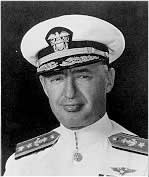Joseph J. Clark
Joseph James "Jocko" Clark (born November 12, 1893 in Chelsea , Oklahoma , † July 13, 1971 in St. Albans , New York City ) was an American admiral in the United States Navy during World War II . A Cherokee , Clark was the first graduate of Native American descent from the United States Naval Academy in 1917 .
During World War II, he first commanded the aircraft carriers USS Suwannee (CVE-27) and USS Yorktown (CV-10) before being promoted to Rear Admiral in 1944 and taking command of Task Force 58 . This task force commanded Clark during the Mariana Campaign, including the battle in the Philippine Sea . Its flagship was the USS Hornet (CV-12). When the warplanes did not return until after sunset on the second day of the battle, he ordered the ships to be fully lit so that most planes could land safely.
During the Korean War , Clark commanded the Fast Carrier Task Force (TF 77). After his promotion to Vice Admiral, the entire 7th US fleet was under his control .
Clark retired on December 1, 1953 with the rank of admiral. During his career, he has received the Navy Cross , the Distinguished Service Medal , the Legion of Merit , the Silver Star , the Navy Commendation Medal, and the Korean Order of Military Merit , among others . After his death on July 13, 1971, he was buried in Arlington National Cemetery .
The frigate USS Clark (FFG-11) was given his name in his honor.
literature
- Joseph J. Clark, Clark G. Reynolds : Carrier admiral. D. McKay Co., New York NY 1967.
- Clark G. Reynolds: On the warpath in the Pacific. Admiral Jocko Clark and the fast carriers. Naval Institute Press et al., Annapolis MD et al. 2005, ISBN 1-591-14716-6 .
Web links
- Rear Admiral JJ Jocko Clark - Biography from JackLummus.com
- Joseph James Jocko Clark, Admiral, United States Navy - From ArlingtonCemetery.net
| personal data | |
|---|---|
| SURNAME | Clark, Joseph J. |
| ALTERNATIVE NAMES | Clark, Joseph James (full name); Clark, Jocko (nickname) |
| BRIEF DESCRIPTION | American admiral in the United States Navy during World War II |
| DATE OF BIRTH | November 12, 1893 |
| PLACE OF BIRTH | Chelsea , Oklahoma |
| DATE OF DEATH | July 13, 1971 |
| Place of death | St. Albans , New York City |

